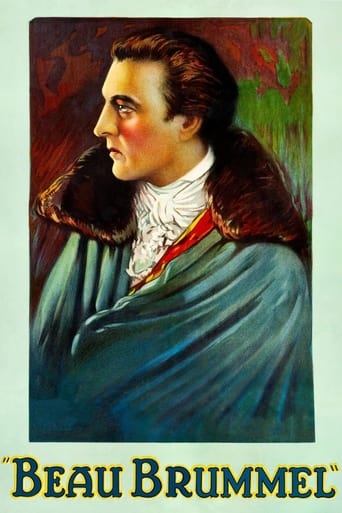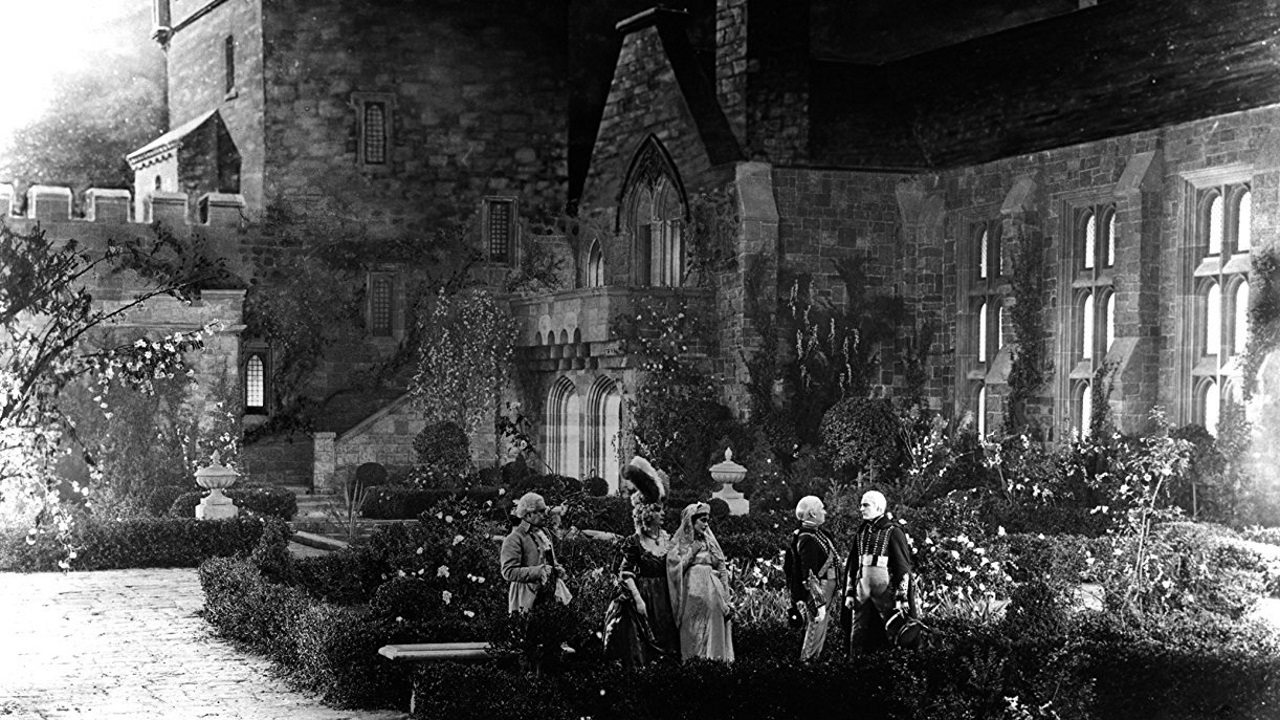blanche-2
This silent version of "Beau Brummel" (there was one in 1913) stars the great John Barrymore in the title role, and he manages without speaking to give us a clear, layered view of this vain social climber. Also starring are Mary Astor, Carmel Myers, and Irene Rich as three of the women in his life. Mary Astor was nearly unrecognizable - low, long eyebrows (they all seemed to have them) and different teeth, and 18 years old! Though in black and white, the sumptuousness of the costumes and the beauty of the sets, as well as the prevailing atmosphere, are all evident. Brummel resigns his commission so that he can literally hang out with the Prince of Wales, who becomes George IV. When he falls out of favor, he also falls on hard times. The woman he loses to her marriage into a wealthy family, Lady Alvanley, remains a loyal friend as does his butler Mortimer.Barrymore's acting, particularly in his last scenes, is brilliant. Thankfully he went into talkies so we would have a chance to hear his beautiful speaking voice.Superior to the MGM color version starring Stewart Granger.
MartinHafer
For 1924, this is a truly exquisite looking film. You can tell that the fledgling studio, Warner, really pulled out all the stops to make this film a success--great sets, camera-work and even recruiting John Barrymore back from the stage to star in this film. However, despite all these positives, the overall effect isn't all that engaging--thanks to a very weak story that practically put me to sleep.The problem with the story is that Beau Brummel is a very, very flawed man. At first, you see him as flawed but decent. Later in the film, he just seems like a jerk--allowing his way overblown ego to ultimately destroy him. In fact, this made the second half of the film much tougher going because it was hard to care about a man who simply didn't deserve it. Plus, so much of the film consisted of rather syrupy love scenes and Barrymore's acting was really over the top. While I love many of Barrymore's films, in this one he seemed a bit "hammy"--nothing like his later film roles.Without a serious re-working of the film, this one turned out to be very pretty but ultimately as dull as the later Stewart Granger re-make. Pretty to look at but not very satisfying--it's like eating a meal entirely of unflavored rice cakes.
lugonian
BEAU BRUMMEL (A Warner Brothers Classic of the Screen, 1924), directed by Harry Beaumont, from the play and historical data by Clyde Finch, stars the legendary John Barrymore in one of his most prestigious films of the silent era. Mixing fact and fiction into the life of George Bryan Brummell (1778-1840), an English social arbiter, the opening inter-title sums it up best: "Nowhere in all history can be found a more amazing character than George Bryan Brummel, the friend of princes, the arbiter of fashion and the social ruler of England during the reign of George II. And nowhere in all fiction can be found more romance than was crowded into the life of this penniless commoner, whose natural charm and studied insolence made him the greatest dandy of all time - the immortal Beau Brummel." For the plot summary, beginning in the year 1795, George Bryan Brummel (John Barrymore), British Army officer and captain of the Tenth Hussars, deeply loves Margery Werthaim (Mary Astor). Because her mother (Clarissa Selwynne), "ambitious, relentless," finds Brummel to be a young man of no importance, insists Marjory wed Lord Alvanloy (William Humphrey) instead. As she takes her daughter to get married, Alvanloy leaves Brummel in the garden in humiliation by throwing him a sixpence. Next scene: "Revenge was all he thought of now. He would use his charmed wit and personal appearance in a game against the society which has robbed him of his love." For the years to follow, Brummel does just that. Through the guidance of the Prince of Wales (Willard Louis), Brummel makes his way through society, resigns from the Army, abandons his whig for a more natural hair, has an affair with Mrs. Snodgrass (Betty Brice), the landlord's (James Marcus), wife; and makes his indiscretions with the ladies of the court, particularly Lady Hester (Carmel Myers), wife of Lord Henry Stanhope (Richard Tucker), whom he finds terribly annoying; and Frederica Charlotte (Irene Rich), sister-in-law of the Prince of Wales, whom he claims to be a tender woman, all of whom he loves and leaves. Making many enemies and finding himself heavily in debt, he at first serves time in a jail in Calais, and later finds himself living in poverty. His only true friend during his declining years is his servant, Mortimer (Alec B. Francis), whom he dismisses from his employ for being too helpful. Falling out of love with everything, Brummel is approached by Marjory, only to lose her again as explained with these words: "Death kills but once, life kills many times." What further develops remains to be seen. At first glance, BEAU BRUMMEL comes across as an overlong (128 minutes) dull costume drama about doomed love (with portions closely resembling George Du Maurier's PETER IBBETSON), redeemed by sincere yet "ham" acting of John Barrymore, from a young dandy to aged old man (with a striking resemblance to the older appearance of his brother, Lionel), and the ever youthful Mary Astor, both of whom would be reunited in DON JUAN (Warners, 1926), and supporting Claudette Colbert in the sound comedy, MIDNIGHT (Paramount, 1939). Looking over and comprehending everything not absorbed the first time around, this can now classified as a rich atmospheric production with fine acting, by 1920s standards, and detailed period pieces of long, long ago. Although there's really no action involving sword play to stir up excitement, there's little suspense midway involving a duel a Bowling Green between Brummel and a jealous husband.BEAU BRUMMEL, a fortunate survivor of the silent film era, is not as relatively known as others from that era. In the wake of home video, however, it was placed on video cassette during the late 1980s through various distributors, including Video Yesteryear and Grapevine Video, just to name a few, mostly with missing footage and poor quality visuals. It can also be acquired in the DVD format as well.Cable television's Turner Classic Movies brought BEAU BRUMMEL back to life by having a restored copy for its January 29, 2008 presentation accompanied by new and exceptional orchestral score conducted by young film composer James Schafer of Rancho Cucamonga, California. Regardless of host Bob Osborne announcing BEAU BRUMMEL making its "world television premiere," in fact, has played on television before in April 1994 on the Nostalgia Channel as part of its Saturday night weekly presentation of "When Silents Were Golden." Aside from an already pre-recorded orchestral score from a 1930s reissue used for this feature, watching BEAU BRUMMEL or any silent movie for that matter, couldn't really be fully appreciated on the Nostalgia Channel due to its frequent commercial interruptions. Now that it has finally turned up on the commercial free TCM, BEAU BRUMMEL may have its chance of rediscovery to the delight of film enthusiasts wanting to compare this with its 1954 remake (with Brummel ending with two L's) starring Stewart Granger, Elizabeth Taylor and Peter Ustinov. (***)
rsoonsa
Clyde Fitch's play, written for renowned stage actor Richard Mansfield, is a very romantic interpretation of incidents in the life of George (Beau) Brummel, the Regency dandy whose name has become a watchword for sartorial splendour and correctness, and is itself freely adapted for this film that showcases the unparallelled talent of John Barrymore in his prime as Brummel. With revenge in his heart, Brummel sets out to manipulate London society in a great game due to his, because of an untitled station, having lost his lover, played well by 18 year old Mary Astor with whom Barrymore began an affair during this filming, and he utilizes a close relationship with his sponsor, the Prince of Wales, the Regent (later King George IV), to advance his plan. Barrymore's control of his scenes is unmatched as he expresses the widest possible range of emotion and reaction with the smallest movement of eyes or mouth and, although there are opportunities aplenty for emoting, his utilization of a prolonged gaze into the eyes of a lover or foe speaks volumes. Barrymore is strongly assisted by a very able supporting cast, including Willard Louis as the Prince of Wales, Aleck B. Francis as Brummel's loyal manservant and, as the Duchess of York, the exquisite Irene Rich, whose rhythms and ability to focus upon her character's persona nicely complements Barrymore during their shared scenes. Harry Beaumont, as always, directs capably and is assisted enormously with his efforts by cinematographer David Abel, whose skill with large groups during complicated action was later markedly in evidence as he supervised the cameras during the best of the Astaire/Rogers films. Somewhat more than a cavil might be a desire for the scenario to have presented more of Brummel's full life rather than the lengthy treatment given to its denouement, and that lacking in accuracy, but certainly allowing Barrymore a good deal of dramatic opportunity that does not go shunned.


 AD
AD


